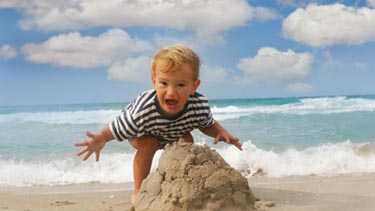
Spending time outdoors is a common activity on spring breaks or summer vacations, but remember to protect against the sun’s rays. Everyone is at risk for sunburn. Children especially need to be protected from the sun’s burning rays, since most sun damage occurs in childhood. Like other burns, sunburn will leave the skin red, warm, and painful. In severe cases, it may cause blistering, fever, chills, headache, and a general feeling of illness. The American Academy of Pediatrics offers tips to keep children safe in the sun.
Sun Safety and Protection under 6 Months
- Babies under 6 months of age should be kept out of direct sunlight. Move your baby to the shade under a tree, umbrella or stroller canopy. Dress babies in lightweight clothing that covers the arms and legs, and use brimmed hats that shade the neck to prevent sunburn.
- When adequate clothing and shade are not available, parents can apply a minimal amount of sunscreen with at least 15 SPF It is okay to apply a small amount of sunscreen on infants under 6 months if there is no way to avoid the sun SPF (sun protection factor) to small areas, such as the infant’s face and the back of the hands. Remember it takes 30 minutes to be effective.
- If an infant gets sunburn, apply cool compresses to the affected area.
Sun Safety for Kids
- The first, and best, line of defense against harmful ultraviolet radiation (UVR) exposure is covering up. Stay in the shade whenever possible, and limit sun exposure during the peak intensity hours – between 10 a.m. and 4 p.m.
- Select clothes made of tightly woven fabrics. Cotton clothing is both cool and protective. Try to find a wide-brimmed hat that can shade the cheeks, chin, ears and back of the neck. Sunglasses with ultraviolet (UV) protection are also a good idea for protecting your child’s eyes.
- Apply sunscreen with an SPF 15 or greater to areas of your child’s skin that aren’t covered by clothing. Before applying, test the sunscreen on your child’s back for an allergic reaction. Apply carefully around the eyes, avoiding eyelids. If a rash develops, talk with your pediatrician.
- Be sure to apply enough sunscreen — about one ounce per sitting for a young adult.
- Reapply sunscreen every two hours, or after swimming or sweating.
- If your child gets sunburn that results in blistering, pain or fever, contact your pediatrician.
Sun Safety for the Family
- The sun’s rays are the strongest between 10 a.m. and 4 p.m. Try to keep out of the sun during those hours.
- The sun’s damaging UV rays can bounce back from sand, water, snow or concrete; so be particularly careful of these areas.
- Wear commercially available sun-protective clothing, like swim shirts.
- Most of the sun’s rays can come through the clouds on an overcast day; so use sun protection even on cloudy days.
- When choosing a sunscreen, look for the words “broad-spectrum” on the label – it means that the sunscreen will protect against both ultraviolet B (UVB) and ultraviolet A (UVA) rays. Choose a water-resistant sunscreen and reapply every two hours or after swimming, sweating or towel drying. You may want to select a sunscreen that does not contain the ingredient oxybenzone, a sunscreen chemical that may have hormonal properties.
- Zinc oxide, a very effective sunscreen, can be used as extra protection on the nose, cheeks, top of the ears and on the shoulders.
- Use a sun protection factor (SPF) of at least 15. The additional benefits of using sunscreen with SPF 50+ are limited.
- Rub sunscreen in well, making sure to cover all exposed areas, especially the face, nose, ears, feet and hands, and even the backs of the knees.
- Put on sunscreen 30 minutes before going outdoors – it needs time to work on the skin.
- Sunscreens should be used for sun protection and not as a reason to stay in the sun longer.
Additional Information
- Last Updated
- 3/13/2018
The information contained on this Web site should not be used as a substitute for the medical care and advice of your pediatrician. There may be variations in treatment that your pediatrician may recommend based on individual facts and circumstances.

Recent Comments